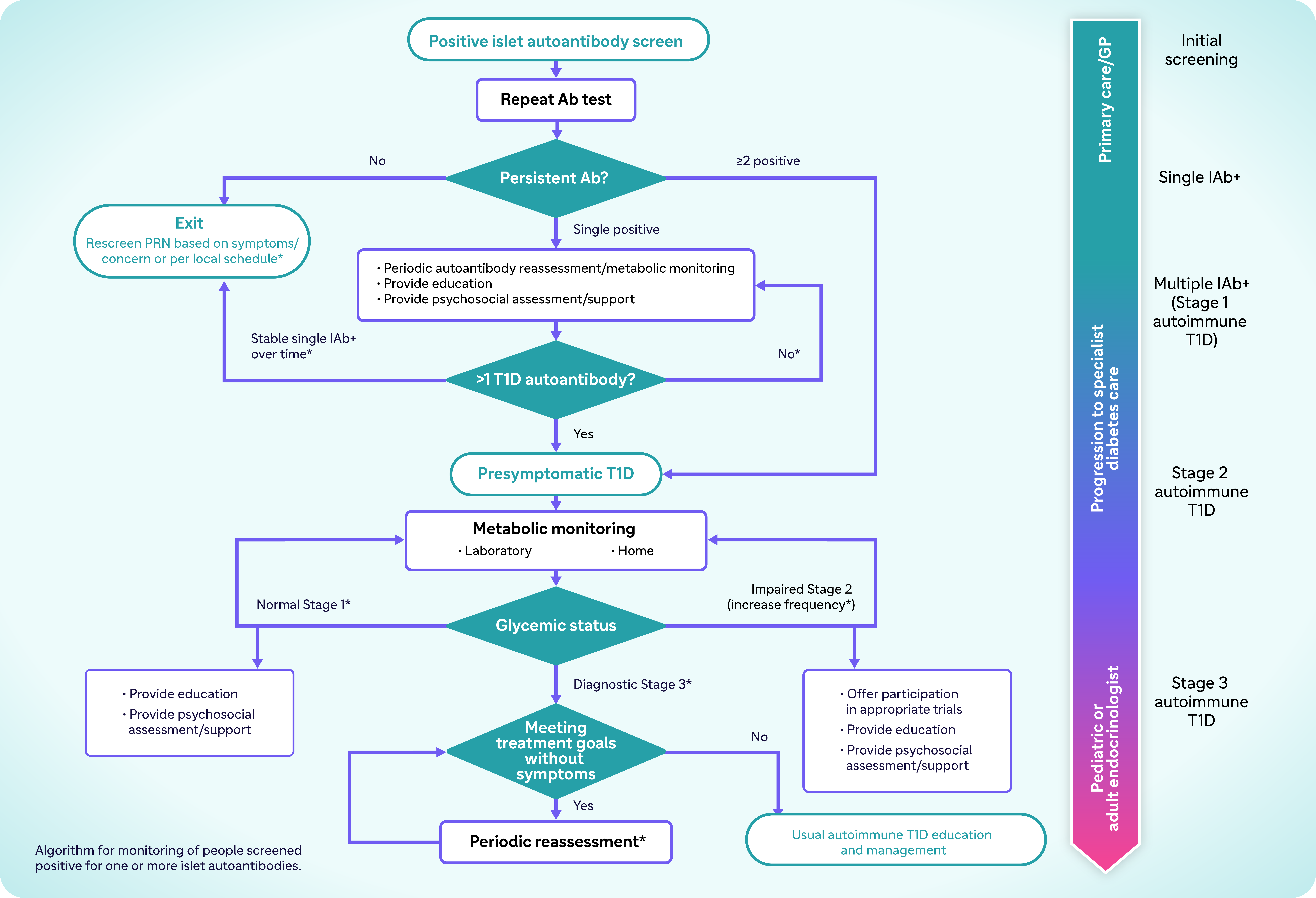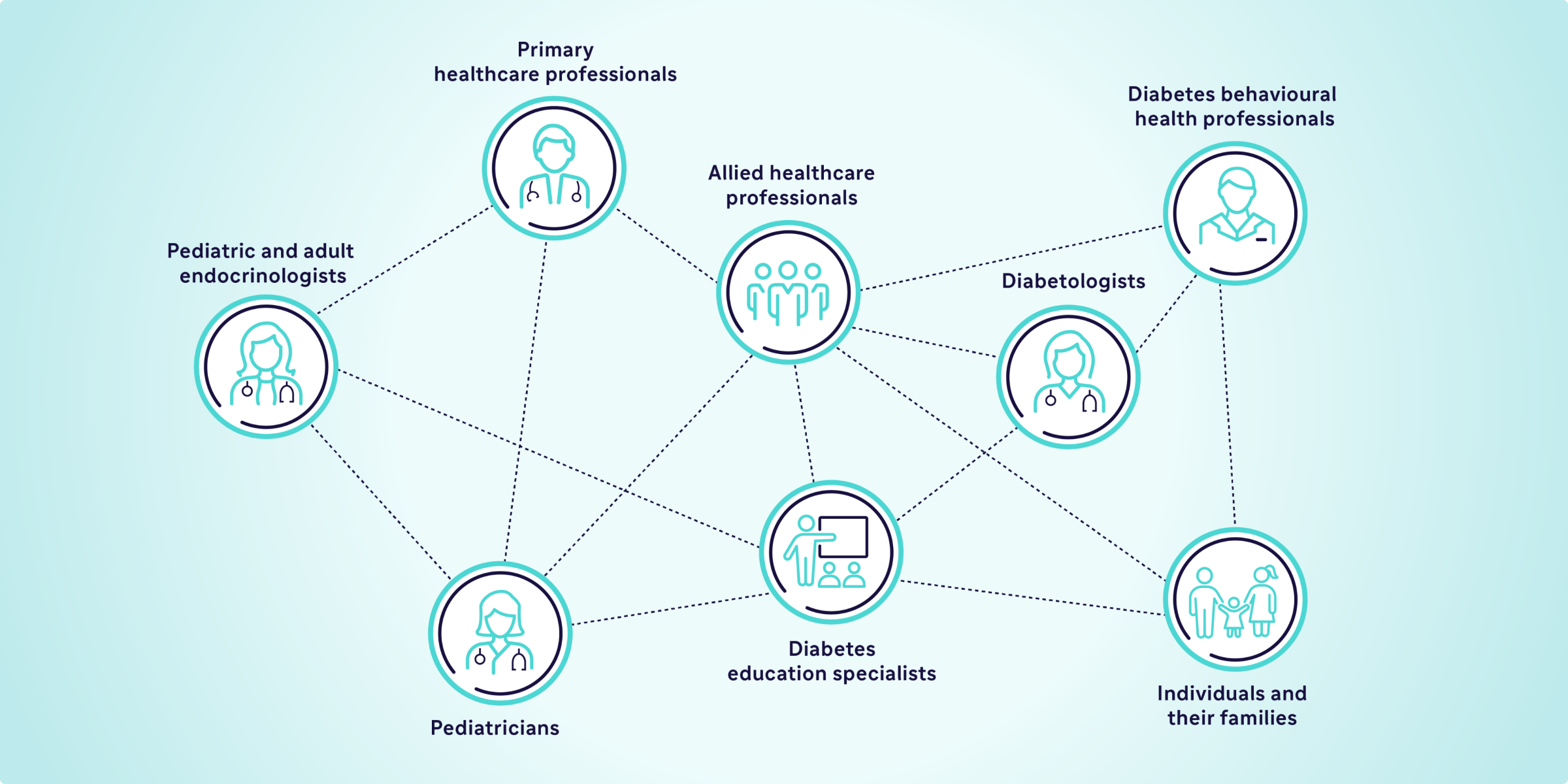Guidelines
Guidelines recognize the importance of early risk monitoring for autoimmune T1D – before symptoms develop
At the 2024 American Diabetes Association’s (ADA) 84th Scientific Sessions, new international consensus between international experts and societies were presented on how healthcare professionals can improve the care of people living with autoantibodies in early-stage autoimmune T1D.1
See the Consensus Guidance for Monitoring Individuals with Islet Autoantibody-Positive Pre-Stage 3 Type 1 Diabetes
The international societies that developed the consensus guidance included the:
- American Diabetes Association (ADA)
- European Association for the Study of Diabetes (EASD)
- American Association of Clinical Endocrinology (AACE)
- American College of Diabetology (ACD)
- Association of Diabetes Care & Education Specialists (ADCES)
- Australian Diabetes Society (ADS)
- International Society for Pediatric and Adolescent Diabetes (ISPAD)
- Advanced Technologies & Treatments for Diabetes (ATTD)
- DiaUnion, the Endocrine Society, and JDRF International
The monitoring consensus guidance includes recommendations for:2
- Preventing DKA and minimizing the risk of requiring emergency care or hospital admission
- Identifying and monitoring autoimmune T1D
- Avoiding the consequences of hyperglycemia on long-term glycemic outcomes
- Reducing the misdiagnoses of autoimmune T1D
- Referring eligible patients for participation in screening programs
See what guidelines are saying
The international societies acknowledge a paradigm shift2
“Decades of subsequent research and monitoring of individuals with islet autoantibody positivity has led to the paradigm shift that type 1 diabetes is a continuum of stages, from genetic risk through to autoimmunity and then metabolic disease.”2
The International Society for Pediatric and Adolescent Diabetes (ISPAD) recognizes a change is on the horizon3
“Screening for risk of T1D is gaining international momentum. […] In time, screening is likely to be embedded in local, regional, and national health systems as the standard of care.”3
Experts across international associations reached consensus on the importance of proactive screening4
“Both DKA and [hyperosmolar hyperglycemic state] can occur at any age in people with type 1 diabetes, type 2 diabetes or any other type of diabetes. DKA is more common in young people with type 1 diabetes.”4
Diabetes Canada recognizes the value of early detection in people with a family history of autoimmune T1D5
“The loss of pancreatic beta cells in the development of type 1 diabetes passes through a subclinical prodrome that can be detected reliably in first- and second-degree relatives of persons with type 1 diabetes by the presence of pancreatic islet autoantibodies in their sera.”5
Importance of early monitoring and staging
Aim to detect and stage autoimmune T1D early. This creates opportunities for the individual and their family to learn and prepare for the condition. Monitoring also provides a benchmark for glycemic status, helping patients avoid DKA.6
Consensus guidance recommends glycemic testing (continuous glucose monitoring, oral glucose tolerance test, glycosylated hemoglobin testing) and ongoing monitoring for individuals who test positive for two or more diabetes-related autoantibodies.2
French expert opinion recognizes the importance of screening for preclinical autoimmune T1D
“The possibility of detecting T1D at its preclinical stages by measuring autoantibodies now allows for an earlier initiation of care, particularly for relatives of people living with T1D (PwT1D), who present a higher genetic risk than the general population. Screening now makes it possible to prevent inaugural ketoacidosis, prolonged hospitalizations and rapid deterioration of residual insulin secretion, all of which are responsible for glycemic instability and a higher risk of long-term complications.”7
International societies' consensus algorithm for monitoring people with positive autoantibodies2

| * |
Monitoring frequency and methodology depends on age, length of time since first detection of islet autoantibody, number of islet autoantibodies detected and presence of symptoms of T1D. |
Adapted from Phillip M, et al.
Counselling and education for individuals and their families
Early detection of autoimmune T1D necessitates follow-up education and counselling to address potential feelings of stress, anxiety and other psychological issues.
Education can improve quality of life and reduce parental stress when autoimmune T1D is detected in the early presymptomatic stages.5
Following through with post-screening counselling
Counselling should address individual and caregiver concerns when screening and confirmatory tests indicate the presence of diabetes-related autoantibodies.
Advocacy for all patients, regardless of socioeconomic or racial or ethnic background, is essential to ensure equal opportunities for autoimmune T1D screening and monitoring.5
Steps towards providing education on autoimmune T1D staging
Current guidelines recommend that patients and caregivers will need comprehensive diabetes education and support after confirming Stage 1 or 2 autoimmune T1D. Referral to a specialized diabetes centre is recommended.
Healthcare professionals should explain the likelihood of progressing to Stage 3 based on the number of autoantibodies and glycemic status, discuss the rationale for glucose monitoring, and make patients aware of symptoms indicating hyperglycemia and potential DKA.
A collaborative strategy for monitoring disease progression should be developed, including various options for blood glucose monitoring tailored to individual needs and circumstances.
Clear guidance for clinical follow-up and access to ongoing counselling should also be included in the plan.5
Everyone plays a part in autoimmune T1D monitoring2

- American Diabetes Association. American Diabetes Association Showcases Innovations and Guidance for Early Risk Monitoring of Type 1 Diabetes. June 24, 2024. Available at: https://diabetes.org/newsroom/press-releases/american-diabetes-association-showcases-innovations-and-guidance-early-risk#:~:text=An%20international%20consensus%20provided%20insights,predicting%20disease%20progression%20and%20risk. Accessed July 19, 2024.
- Phillip M, et al. Consensus guidance for monitoring individuals with islet autoantibody-positive pre-stage 3 type 1 diabetes. Diabetes Care 2024 Jun 24:dci240042. doi: 10.2337/dci24-0042. Online ahead of print.
- Besser REJ, et al. ISPAD clinical practice consensus guidelines 2022: Stages of type 1 diabetes in children and adolescents. Pediatr Diabetes 2022;23(8):1175–87.
- Umpierrez GE, et al. Hyperglycaemic crises in adults with diabetes: a consensus report. Diabetologia 2024;67:1455–79. doi: 10.1007/s00125-024-06183-8.
- Ekoe J-M, et al. Screening for Diabetes in Adults. Can J Diabetes 2018;42:S16–9.
- Moore DJ, et al. Recommendations for Screening and Monitoring the Stages of Type 1 Diabetes in the Immune Therapy Era. Int J Gen Med 2024;17:3003–14.
- Mallone R, et al. Dépistage et prise en charge du diabète de type 1 préclinique, stade 1–2. Prise de position d’experts français. Screening and care of preclinical stage 1-2 type 1 diabetes. French expert position statement. Med Mal Metab 2024; online ahead of print.


